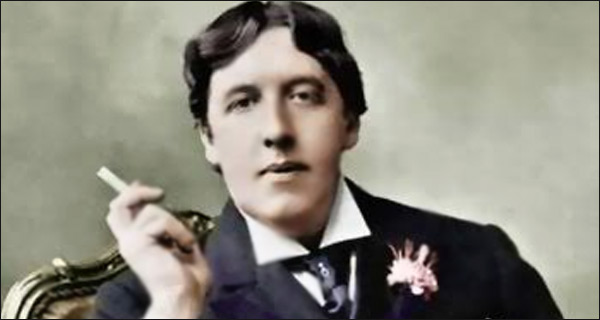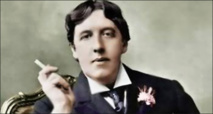Wilde fled to Paris in 1897 after being hounded out of England having served two years in jail with hard labour for his doomed love for Lord Alfred Douglas.
His grandson Merlin Holland, who has helped put the show together, said it is "still very hard to read" some of his letters written on blue prison paper "where Oscar is on his knees" begging for clemency.
"To see him have to plead like is quite hard to take. Having to say that he was 'suffering from the most horrible form of erotomania... which left him the prey of the most revolting passions' was just not Oscar. It showed how desperate he was," Holland told AFP.
The show at the Petit Palais also includes the misspelt calling card left by Douglas' father, the Marquess of Queensberry, which led to Wilde's fall.
The fiery aristocrat, who wrote the rules of modern boxing, scrawled on front, "For Oscar Wilde posing Somdomite" [sic].
- World collapsed -
Disastrously as it turned out, Wilde sued Queensberry for criminal libel.
"A man cannot be too careful in the choice of his enemies," Wilde once wrote. And Queensberry was a vicious adversary.
He hired a team of private detectives to trawl the London underworld for evidence of the writer's "depravity", and Wilde's Dublin university contemporary Edward Carson as a barrister to bait him in court.
The original court transcript of the trial shows the very moment Wilde's world collapsed.
Pressed over whether he had kissed a young man, Wilde fatally played to the gallery by saying, "No, never in my life. He was a peculiarly plain boy."
The writer had been at the height of his powers with his masterpiece "The Important of Being Earnest" playing to packed houses in London.
But his downfall was instant and terrible.
- 'Untouchable' -
"It is hard to overestimate how much he was razed from society," Holland added. "He became an untouchable overnight."
As he left court a warrant was issued for his arrest on charges of sodomy and gross indecency. He was quickly tried and the Paris show, which runs till January 15, also has the handbill advertising the sale of his possessions, including "Moorish and Oriental curiosities", which had been seized by the court.
"They left him with nothing," said Holland.
Wilde wrote the "Ballad of Reading Gaol" under the pseudonym of his prisoner number, C33, after fleeing to France.
"It was only in the fifth edition that the publishers dared put his name on it, and then it was only inside in brackets," said Holland.
The show also includes photos of the bedroom in the Hotel d'Alsace on Paris' Left Bank where he spent his final days on credit from its kindly owner.
Wilde's tomb is still one of the most visited in the city's Pere Lachaise cemetery.
But the greater part of the exhibition is dedicated to Wilde cutting a swathe through London and Paris society and his barnstorming tour of America.
It also brings out his passion for art, which Holland told AFP "he believed was the civilising influence in the world".
The show also includes several Pre-Raphaelite paintings Wilde wrote about in 1877 and 1879 as well as work by his friend Aubrey Beardsley, who famously illustrated "Salome", the play Wilde wrote in French for the era's leading lady, Sarah Bernhardt.
Curator Dominique Morel said a major Wilde show was long overdue in France. He said it "contains many unseen and extremely hard to acquire material" thanks to the help of the Turkish philanthropist and Wilde expert Omer Koc, who loaned some of his "astonishing collection" of the writer's letters and papers.
------------------------------------------------------------------------------------------------------------------------
His grandson Merlin Holland, who has helped put the show together, said it is "still very hard to read" some of his letters written on blue prison paper "where Oscar is on his knees" begging for clemency.
"To see him have to plead like is quite hard to take. Having to say that he was 'suffering from the most horrible form of erotomania... which left him the prey of the most revolting passions' was just not Oscar. It showed how desperate he was," Holland told AFP.
The show at the Petit Palais also includes the misspelt calling card left by Douglas' father, the Marquess of Queensberry, which led to Wilde's fall.
The fiery aristocrat, who wrote the rules of modern boxing, scrawled on front, "For Oscar Wilde posing Somdomite" [sic].
- World collapsed -
Disastrously as it turned out, Wilde sued Queensberry for criminal libel.
"A man cannot be too careful in the choice of his enemies," Wilde once wrote. And Queensberry was a vicious adversary.
He hired a team of private detectives to trawl the London underworld for evidence of the writer's "depravity", and Wilde's Dublin university contemporary Edward Carson as a barrister to bait him in court.
The original court transcript of the trial shows the very moment Wilde's world collapsed.
Pressed over whether he had kissed a young man, Wilde fatally played to the gallery by saying, "No, never in my life. He was a peculiarly plain boy."
The writer had been at the height of his powers with his masterpiece "The Important of Being Earnest" playing to packed houses in London.
But his downfall was instant and terrible.
- 'Untouchable' -
"It is hard to overestimate how much he was razed from society," Holland added. "He became an untouchable overnight."
As he left court a warrant was issued for his arrest on charges of sodomy and gross indecency. He was quickly tried and the Paris show, which runs till January 15, also has the handbill advertising the sale of his possessions, including "Moorish and Oriental curiosities", which had been seized by the court.
"They left him with nothing," said Holland.
Wilde wrote the "Ballad of Reading Gaol" under the pseudonym of his prisoner number, C33, after fleeing to France.
"It was only in the fifth edition that the publishers dared put his name on it, and then it was only inside in brackets," said Holland.
The show also includes photos of the bedroom in the Hotel d'Alsace on Paris' Left Bank where he spent his final days on credit from its kindly owner.
Wilde's tomb is still one of the most visited in the city's Pere Lachaise cemetery.
But the greater part of the exhibition is dedicated to Wilde cutting a swathe through London and Paris society and his barnstorming tour of America.
It also brings out his passion for art, which Holland told AFP "he believed was the civilising influence in the world".
The show also includes several Pre-Raphaelite paintings Wilde wrote about in 1877 and 1879 as well as work by his friend Aubrey Beardsley, who famously illustrated "Salome", the play Wilde wrote in French for the era's leading lady, Sarah Bernhardt.
Curator Dominique Morel said a major Wilde show was long overdue in France. He said it "contains many unseen and extremely hard to acquire material" thanks to the help of the Turkish philanthropist and Wilde expert Omer Koc, who loaned some of his "astonishing collection" of the writer's letters and papers.
------------------------------------------------------------------------------------------------------------------------









 Home
Home Politics
Politics











